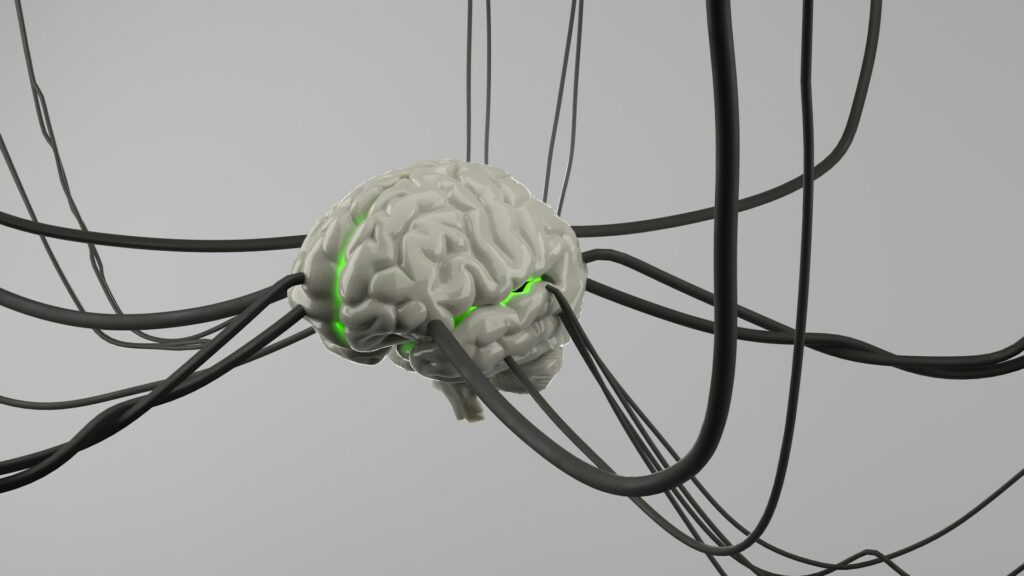Brain-computer interfaces are technologies that blur the line between the human mind and machines. Brain-Computer Interfaces

Brain-computer interfaces are technologies that blur the line between the human mind and machines. Brain-Computer Interfaces
Brain-computer interfaces (BCIs) are technological devices that provide a direct communication channel between the human brain and external objects, such as computers, robots, and prosthetic limbs. Brain-computer interfaces (BCIs) enable people to exert control over computers, machinery, or even artificial limbs. They do this by deciphering signals from the brain and then converting them into instructions, so eliminating the need for conventional physical input techniques.
An Explanation of How BCIs Function
Brain-computer interfaces (BCIs) depend on sensors that record the activity of neurons. It is possible to do this in a non-invasive manner by using electroencephalogram (EEG) headsets, or in an invasive manner by using electrodes that are implanted in the brain. Following that, algorithms analyze the signals that were acquired and turn the brain activity into orders that can be carried out. These interfaces are getting quicker, more precise, and more dependable as computer power and signal processing continue to increase.
Medical applications
The healthcare industry is where one may observe the most immediate advantages of brain-computer interfaces (BCIs). Through the use of robotic limbs that are controlled by the patient’s thoughts, individuals who are paralyzed may recover their ability to move. Brain-computer interfaces (BCIs) allow people who are living with neurological illnesses, such as amyotrophic lateral sclerosis (ALS), to communicate by choosing words that are shown on a screen. Brain-computer interfaces (BCIs) are used in rehabilitation to assist in retraining the brain after strokes or injuries, providing new avenues for recovery.
Improvement of Human Potential
Brain-computer interfaces (BCIs) have the potential to improve human capacities in areas other than medicine. Imagine having the ability to operate digital gadgets, drones, or automobiles just by thinking about them. Artists and musicians working in creative professions may one day be able to make art or music straight from their brain impulses. The line that separates natural thinking from the execution of machines gets blurred as a result of this convergence of cognition and technology.
Brain-computer interfaces (BCIs) in communication
Communication is one of the most promising uses. Brain-computer interfaces (BCIs) have the potential to enable people to communicate their ideas in voice or text without the need for conventional language boundaries. This creates a whole new universe of expression and freedom for those who have difficulties with speaking.
Integration with artificial intelligence
Artificial intelligence will be an essential component in the future of brain-computer interfaces. Algorithms that are based on machine learning are required in order to decode intricate brain signals and to customize the user experience for each person. Brain-computer interfaces (BCIs) will become increasingly useful for daily life as artificial intelligence continues to grow. This is because they will become more precise, personalized, and scalable as AI gets more powerful.
Issues Related to Ethics and Privacy
Brain-computer interfaces (BCIs), like any other innovative technology, come with their own set of obstacles. There are serious worries about privacy when it comes to having direct access to brain function. Who has the right to claim ownership of data collected on the brain? What can be done to ensure that it is protected? In addition, there are ethical questions around cognitive manipulation, consent, and the possibility of abuse in the context of surveillance or military operations.
Applications in the Workplace and Everyday Life
Brain-computer interfaces (BCIs) may become so integrated into everyday life that they will be indistinguishable from other activities in the future. Employees may be able to handle machines by using orders from their thoughts, gamers may be able to enjoy experiences that completely immerse them in the game, and students may be able to interact with digital information by directly engaging their brains. These potential opportunities have the ability to completely change the way that people engage with technology at all levels.
Difficulties Encountered During the Adoption Process
Despite the progress that has been made, BCIs still encounter obstacles. Although non-invasive technologies often fail to provide accurate results, intrusive implants carry the risk of complications from surgery. Before brain-computer interfaces (BCIs) to become widely used, it will be necessary to overcome other obstacles that include high prices, governmental clearances, and public confidence.
The Path Forward
Experts predict that brain-computer interfaces (BCIs) will become increasingly commonplace by the year 2030, especially in the healthcare and specialized sectors. It is probable that advancements in artificial intelligence (AI), nanotechnology, and wireless technologies may speed up the process of development. The long-term perspective leads to a future in which the boundary that separates digital processing from biological cognition becomes more indistinct.
Advantages of Brain-Computer Interfaces
Helping individuals who have impairments regain their independence
- Improving both the ability to communicate and the ability to move around
- The possibility of increasing human creativity and productivity
- Integration with artificial intelligence (AI) to create experiences that are tailored to each individual
Risks and Challenges
- Issues related to privacy and ethics that arise in connection with brain data
- Problems with affordability and accessibility
- Invasive procedures and the medical hazards that are associated with them
- Social consequences of the merging of technology and people
Brain-computer interfaces (BCIs) are considered to be one of the most promising and intriguing fields in contemporary technology. The ethical, medical, and sociological problems that they bring up are as many as their ability to heal, empower, and augment human capacities. The question of whether or not BCIs will stay specialist tools or evolve into ordinary extensions of the human mind will be decided over the course of the years to come, as innovation continues to speed.




